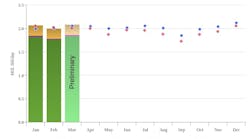Eric Watkins
Oil Diplomacy Editor
LOS ANGELES, Oct. 3 -- Indonesia's declining oil production, as well as its recent departure from the Organization of Petroleum Exporting Countries, is the result of political uncertainty in the country, according to a media report.
The collapse of the Suharto government in 1998 resulted in management confusion at state-run oil company Pertamina, which deterred its Western oil-firm partners from making new investments in Indonesia, according to a report in the Nikkei Business Daily.
The consequent delay in developing new oil fields caused the eventual drop in crude oil production, the paper said. As a result, Indonesia quit OPEC, deciding that further membership was meaningless, as its crude oil output has declined so much that it is now a net oil importer.
Indonesia's withdrawal was accepted at an OPEC meeting in Vienna in September, after which Purnomo Yusgiantoro, Indonesia's minister of energy and mineral resources, issued a statement outlining the country's intention to raise production and rejoin OPEC within a few years.
Indonesia produced more than 1.5 million b/d of crude oil in the mid-1990s, and has been Japan's largest oil supplier outside of the Middle East.
Political instability
However, the political and economic instability following the 1998 fall of the Suharto regime had an adverse impact on oil field development, leading crude oil production to decline rapidly.
By 2004, the country had become a net oil importer, with an output that fell below 1 million b/d last year.
In late May, the government of President Susilo Bambang Yudhoyono announced it would pull out of OPEC. However the withdrawal was also aimed at obtaining public understanding for a sharp price increase for petroleum products that it carried out concurrently with the announcement.
Yudhoyono himself was reportedly reluctant to quit OPEC, but pressure to withdraw had been mounting in parliament. Opponents argued that a net oil importer would not gain anything from membership, which was costing €2 million/year in membership fees.
The government had formulated a plan in 2007 to develop a number of new oil fields to take crude oil output back up to 1.3 million b/d by 2009.
Cepu development delays
Reaching that target is becoming unlikely, however, particularly because of delays in developing the Cepu Block holding the country's largest untapped oil field, which could yield 180,000 b/d.
Besides Cepu in central Java, Indonesia has many promising untapped oil fields, including Jeruk field offshore, with 50,000 b/d potential in East Java Province, and other offshore oil fields within the country's territorial waters.
And in West Papua Province, Korea National Oil Corp. discovered one of the largest oil fields in Indonesia in 2007. It has estimated reserves of 671 million bbl and could yield 150,000-200,000 b/d.
Another government plan is to boost crude oil output to 1.2 million b/d from 950,000 b/d by 2012 in cooperation with such overseas firms as Brazil's state-owned Petroleo Brasileiro SA. However it is uncertain whether such partnerships will be created.
Nevertheless, South Korean, Russian, and Chinese oil companies, including China National Offshore Oil Corp., as well as Western oil majors such as ExxonMobil Corp. and Chevron Corp. are showing a positive stance toward developing crude oil and natural gas fields in Indonesia.
Lack of leadership
According to the Nikkei report, however, crude oil development has been impeded by the Yudhoyono government's lack of leadership and rising nationalism surrounding the country's natural resources.
Yudhoyono, a former military commander who also served as minister of energy and mineral resources, like Suharto regards oil and gas as Indonesia's main means of gaining foreign currency.
Yet he is unable to control internal strife directed at interests in the government and Pertamina, or at growing resource-related nationalism among parliamentarians.
Although it runs the country, Yudhoyono's Democratic Party is a minority party accounting for only 10% of parliamentary seats.
Opposition parties such as the Islamic party argue that oil and natural gas should be supplied preferentially to domestic users at prices lower than international levels. Overseas oil companies oppose such a stance.
An executive at a Western oil company said that although Indonesia has abundant oil and gas resources, there are few negotiations on development projects. The reason, he believes, is the absence of a strong chief executive officer like Suharto.
Contact Eric Watkins at [email protected].
